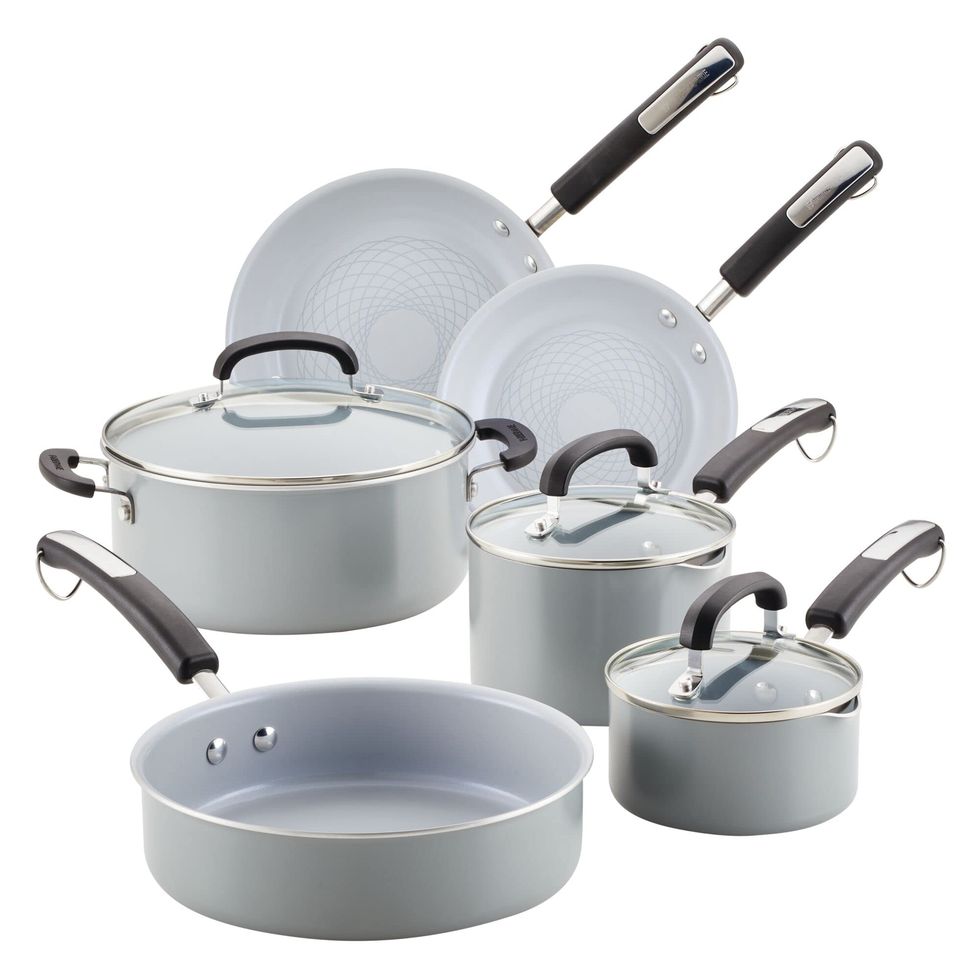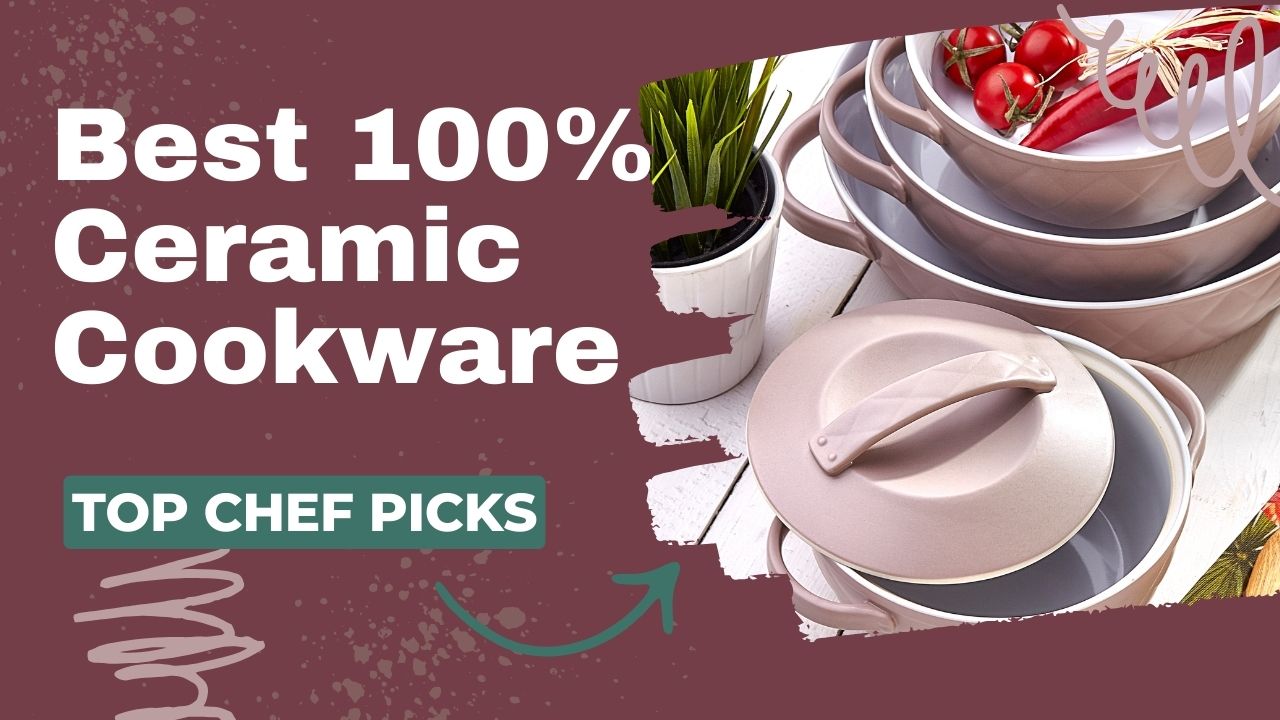As an Amazon Associate, I earn from qualifying purchases
Ceramic cookware is better than aluminum cookware due to its inert material that does not react to differences in pH in foods and does not leach any chemicals into food. Aluminum cookware, on the other hand, can react with acidic foods and cause the metal to leach into the food, leaving a metallic taste.
Additionally, ceramic coating is more durable compared to aluminum cookware, which can chip and wear off over time. Ceramic cookware is a safer and more long-lasting option for cooking.
Table of Contents
ToggleOverview Of Ceramic And Aluminum Cookware
Ceramic and aluminum cookware both have their benefits and drawbacks. Aluminum is lightweight and conducts heat well, while ceramic is non-reactive and doesn’t leach chemicals into food. Deciding which is better depends on personal preferences and cooking needs.
When it comes to cookware options, ceramic and aluminum are two popular choices among home chefs. Understanding the key differences between these materials can help you make an informed decision on which one is better suited for your cooking needs. In this section, we will provide an overview of both ceramic and aluminum cookware, highlighting their unique features and benefits.
Key Differences
Appearance
Ceramic cookware often stands out with its vibrant colors and glossy finish, making it an attractive addition to any kitchen. On the other hand, aluminum cookware tends to have a more utilitarian appearance, typically coming in neutral shades.
Heat Distribution
One of the main differences between ceramic and aluminum cookware lies in their heat distribution capabilities. Ceramic pans tend to distribute heat more evenly, preventing hot spots that can lead to uneven cooking. Aluminum cookware, on the other hand, offers excellent heat conductivity, allowing for quick and efficient cooking.
Durability
When it comes to durability, aluminum cookware has the upper hand. It is generally more resistant to scratches, dents, and wear compared to ceramic cookware. However, ceramic cookware can withstand higher temperatures without the risk of melting or warping.
Health And Safety Concerns
Non-Stick Properties
Ceramic cookware is often praised for its non-stick properties, which allow for easy food release without the need for excessive oil or butter. Aluminum cookware, on the other hand, usually requires the use of cooking oil or other non-stick agents to prevent food from sticking.
Chemical Composition
Some health-conscious individuals may have concerns about the chemicals used in cookware. Ceramic cookware is generally free from toxic substances like PFOA and PTFE, making it a safer option. Aluminum cookware, meanwhile, can leach small amounts of aluminum into food, especially when cooking acidic or high-heat dishes.
Maintenance
Both ceramic and aluminum cookware have specific maintenance requirements. Ceramic cookware should be hand-washed with mild soap and a non-abrasive sponge to preserve its non-stick coating. In contrast, aluminum cookware is often dishwasher-safe, making it easier to clean and maintain.
Overall, the choice between ceramic and aluminum cookware largely depends on your personal preferences and cooking style. Ceramic cookware is ideal for those looking for non-stick properties and even heat distribution, while aluminum cookware offers durability and excellent heat conductivity. Consider factors such as appearance, health concerns, and maintenance when making your decision.

Credit: www.goodhousekeeping.com
Pros And Cons Of Ceramic Cookware
Ceramic cookware has its pros and cons compared to aluminum cookware. The benefits of ceramic include even heat distribution and being chemical-free, while the downsides include possible durability issues and higher cost. Ultimately, it depends on individual preferences and needs.
Ceramic cookware has become increasingly popular in recent years due to its non-stick properties and attractive design. However, like any type of cookware, it has its own set of pros and cons. In this section, we will explore the advantages and disadvantages of using ceramic cookware in your kitchen.
Advantages
One major advantage of ceramic cookware is its non-stick surface. This means that you can cook with minimal oil or butter, making it a healthier choice for those watching their calorie intake. Additionally, the non-stick coating makes it easy to clean, as food residue slides off effortlessly.
Another advantage of ceramic cookware is its ability to distribute heat evenly. This ensures that your food will be cooked uniformly, without any hot spots. This is especially beneficial when cooking delicate dishes that require precise temperature control.
Furthermore, ceramic cookware is known for its durability. While the coating may wear off over time, proper care and maintenance can extend its lifespan. With the right handling, ceramic cookware can withstand high heat and resist scratches and dents.
Additionally, ceramic cookware is aesthetically pleasing. Its sleek and colorful designs can add a touch of elegance to your kitchen and make your cooking experience more enjoyable.
Disadvantages
Despite its many advantages, ceramic cookware does have some drawbacks. One major disadvantage is that the ceramic coating is not as durable as other non-stick materials. Over time, it can crack, chip, and wear off, reducing its effectiveness. It is important to handle ceramic cookware with care to avoid any damage to the coating.
Another drawback of ceramic cookware is its higher price compared to other non-stick alternatives. While it offers numerous benefits, the cost can be a factor to consider when deciding on your cookware investment.
Lastly, the microscopic mineral particles used in ceramic cookware can prevent complete contact between the food and the cooking surface. This can result in slightly altered flavors and textures, although this is usually minimal and may not be noticeable to most people.
In conclusion, ceramic cookware offers numerous advantages such as a non-stick surface, even heat distribution, and durability. However, its disadvantages include a less durable coating, higher price, and potential alterations to the food’s flavors and textures. It is important to weigh these pros and cons carefully to determine if ceramic cookware is the right choice for your kitchen.
Pros And Cons Of Aluminum Cookware
Aluminum cookware is a popular choice in many kitchens due to its excellent heat conductivity and lightweight nature. However, like any other cookware material, it has its own set of advantages and disadvantages. Let’s delve into the pros and cons of aluminum cookware.
Advantages
- Excellent Heat Conduction: Aluminum cookware heats up quickly and evenly, allowing for efficient cooking.
- Lightweight: Its lightweight nature makes it easy to handle, especially when maneuvering on the stovetop.
- Affordability: Aluminum cookware tends to be more budget-friendly compared to other materials, making it a cost-effective choice for many households.
- Versatility: Aluminum cookware is suitable for various cooking methods, including sautéing, boiling, and frying.
Disadvantages
- Susceptibility to Reactivity: Aluminum cookware may react with acidic or alkaline foods, potentially affecting the taste and color of the dish.
- Prone to Warping: It is more susceptible to warping and denting, especially when exposed to high heat or sudden temperature changes.
- Not Suitable for Induction Cooktops: Due to its non-magnetic nature, aluminum cookware is not compatible with induction cooktops unless it has an induction-compatible base.
- Requires Seasoning: Uncoated aluminum cookware may require seasoning to prevent food from sticking, adding an extra step to its maintenance.
:max_bytes(150000):strip_icc()/10-best-ceramic-cookware-sets-of-2023-tout-483633e1a4814231b5c19a3a50ca85c4.jpg)
Credit: www.realsimple.com
Ceramic Cookware Brands And Options
When it comes to choosing between ceramic and aluminum cookware, it’s important to consider their differences. Ceramic cookware is made from inert materials and doesn’t react to pH in foods or leach chemicals, while aluminum cookware is often coated with non-stick materials to prevent burning.
Top Ceramic Cookware Brands
Ceramic Cookware Brands offer a variety of high-quality options
Variety Of Ceramic Cookware Sets
- America’s Test Kitchen
- Crate & Barrel EvenCook
- Caraway Nonstick Ceramic
- T-fal Granite Ceramic
- GreenLife Soft Grip Healthy Ceramic
Healthy Options: Stainless steel, ceramic, and cast-iron cookware are ideal choices
Ceramic cookware is known for its eco-friendliness and long-term durability. Among the best ceramic cookware brands in the market, options like Caraway, GreenPan, and T-fal ensure top-notch quality and safety for your cooking needs.
Aluminum Cookware Brands And Options
Top Aluminum Cookware Brands
For those seeking reliable cookware, top aluminum brands include renowned names such as:
- T-fal
- Rachael Ray
- Cuisinart
- All-Clad
Types Of Aluminum Cookware
Aluminum cookware comes in various types, each serving distinct cooking purposes:
- Aluminum Skillets
- Aluminum Sauce Pans
- Aluminum Stock Pots
- Aluminum Dutch Ovens

Credit: theskillfulcook.com
Frequently Asked Questions Of Which Is Better Ceramic Or Aluminum Cookware
What Is The Healthiest Cookware To Use?
The healthiest cookware options include stainless steel, ceramic, glass, and cast-iron. These materials prevent risky ingredients from seeping into your food. Ceramic cookware is made from inert materials and does not leach chemicals into your food. Avoid aluminum due to its reactivity with acidic foods.
What Is The Disadvantage Of Ceramic Cookware?
Ceramic cookware disadvantages include durability issues, higher cost, and limited food contact due to mineral particles.
What Is The Difference Between Ceramic And Aluminum Cookware?
Ceramic cookware is non-reactive and safe for most foods. Aluminum cookware, often coated for non-stick, conducts heat well.
Why Not To Use Aluminum Pans?
Aluminum pans are reactive with acidic foods, causing them to leach into the food and impart a metallic taste.
Conclusion
After carefully examining the differences between ceramic and aluminum cookware, it’s clear that both offer unique advantages. While aluminum is an excellent heat conductor, ceramic is known for its non-reactive nature. Choosing the best option depends on your cooking style and preferences.
Consider the pros and cons before making your decision.
As an Amazon Associate, I earn from qualifying purchases

